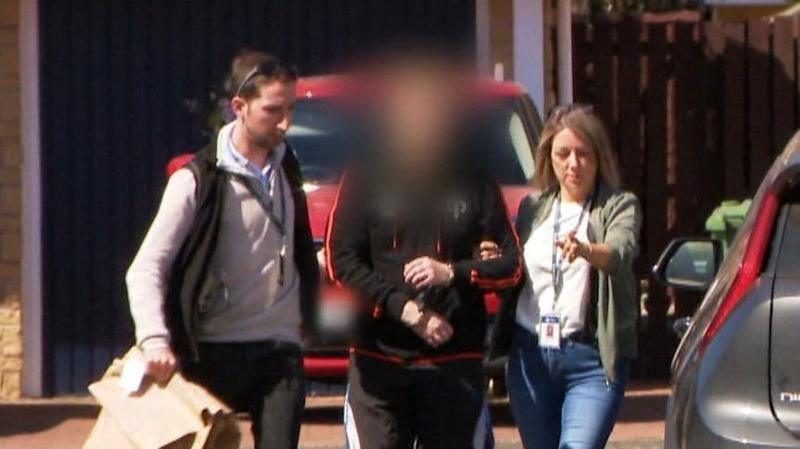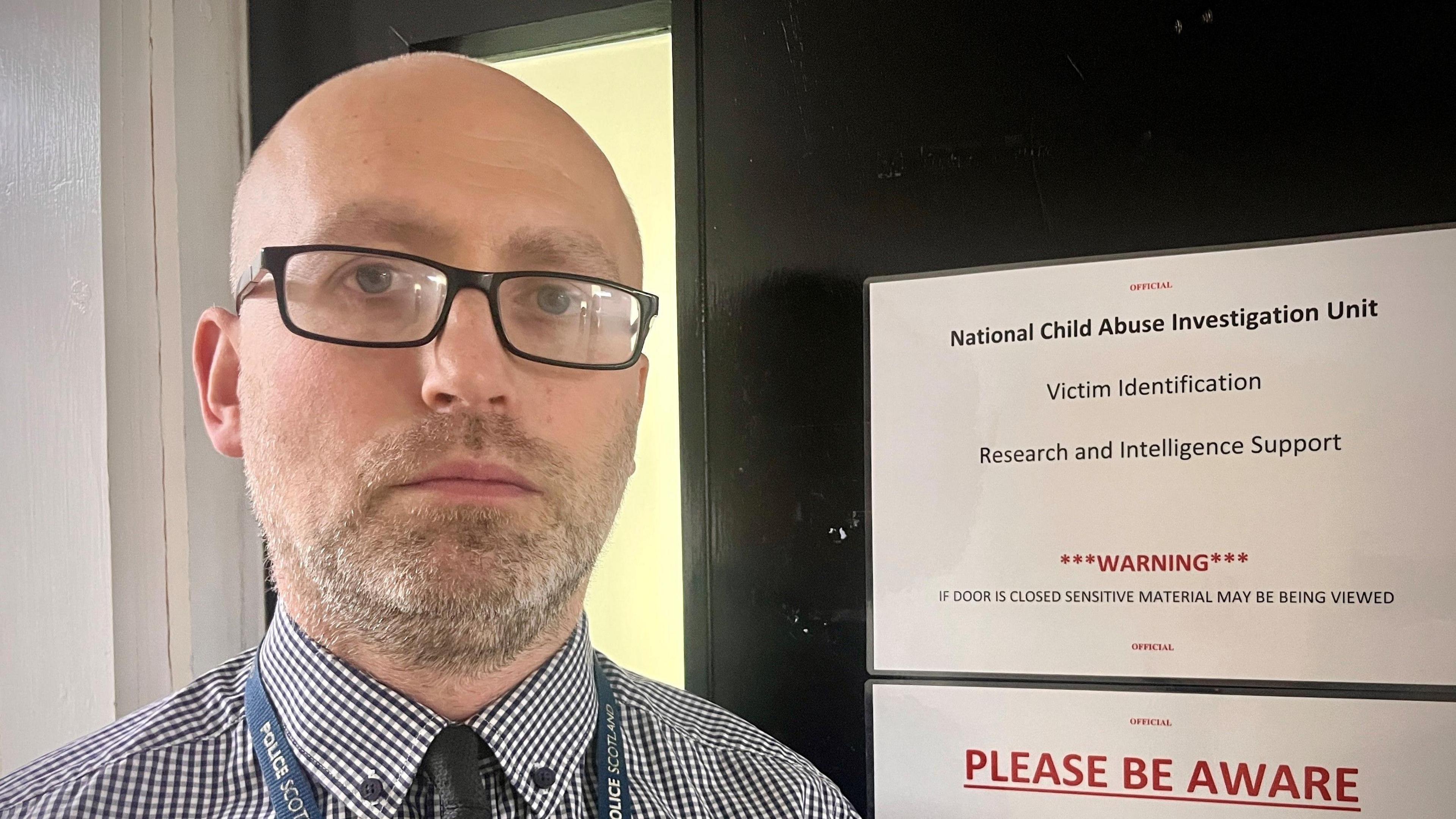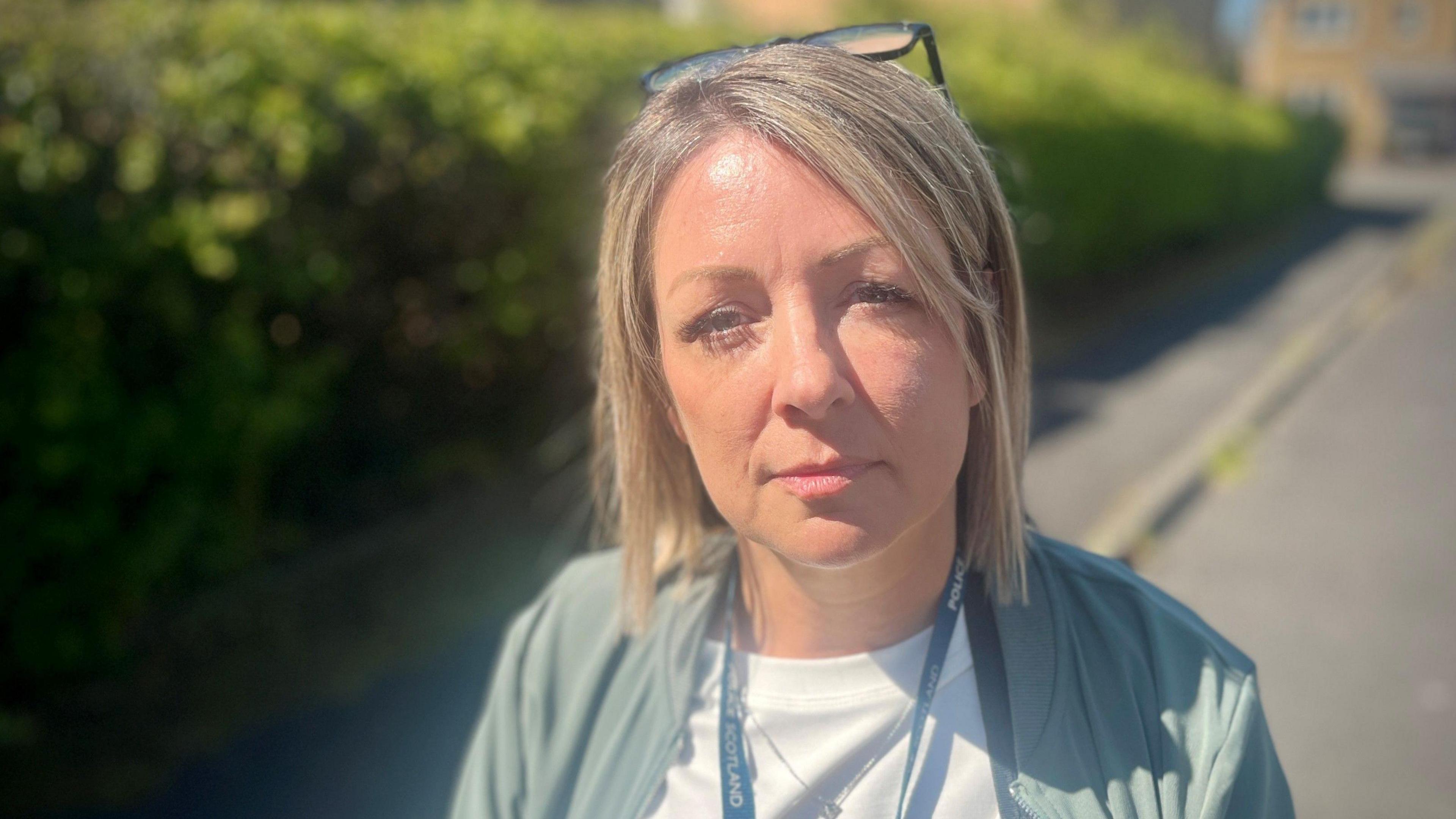A soft knock - how police arrest a suspected paedophile

Police lead away a man suspected of sexual communication with a 13-year-old girl
- Published
It's 07:35 in a smart suburban housing estate in central Scotland and the police are about to turn a family's life upside down.
Three detectives in plain clothes park their unmarked car near a large detached house and knock on the front door.
They work for a specialist unit which investigates online sexual abuse, a crime which affects hundreds of children every year.
A dishevelled man suspected of sexual communication with a 13-year-old girl answers and, after a brief discussion about their search warrant, the officers go in.
What we're watching is a "soft" approach, the polar opposite of a drugs raid. No hard knock, no battering ram, no shouts of "police".
Their tactics mean the peace and quiet of the neighbourhood continues uninterrupted.
But inside the house the ripple effects of the unannounced visit are devastating.
How victims shone a light on 'beastie house' child abuse ring
- Published27 January
Prison officer caught in 13-year-old girl chat sting
- Published21 May
The man's partner is told why the police are there.
The couple's children want to know who the strangers are and the officers try to calm everyone down.
One of the detectives, Joseph Wilson, said: "The only thing I can compare it to in policing is delivering a death message.
"You're telling them the person isn't who they thought they were."
Police Scotland's national child abuse investigation unit invited BBC Scotland News to witness its work amidst a marked change in offending behaviour since the Covid pandemic.
Det Ch Insp Mike Smith said paedophiles were making "extremely dangerous" direct contact with children online more than ever before.
And he warned they could do so within 30 seconds of trying.
The police stopping a new wave of paedophiles in action
What happens next can include grooming the child, coercing them to send indecent images - which are often shared with other paedophiles - and persuading them to meet up.
Det Ch Insp Smith said the perception of online sex offenders as uploaders or downloaders of child sexual abuse material was outdated.
Nearly every case now involves direct contact with a child, with offenders using a range of platforms from social media to streaming.
"For those people who have a deviant sexual interest in children, it's easier than ever to go online and engage with a child," he said.
"You can probably do it within 30 seconds, depending on the platform.
"That's the reality of what we have seen from investigations over the last three years."

Det Ch Insp Mike Smith says it is easier than ever for offenders to make contact with children
The unit carries out 700 child sexual abuse investigations a year - an increase of 30% since 2015.
Every year, its officers are taking steps to safeguard between 600 and 800 children, almost all of them in Scotland.
"People based in Scotland are offending against Scottish children," said Det Chief Insp Smith.
"It's a lot closer to home these days. It's on our doorstep."
"We are actioning between 15 to 20 search warrants on a weekly basis across Scotland.
"Let's be perfectly blunt about it - the demand is through the roof."
The offenders are almost always male and come from all walks of life, including teachers, lawyers and police officers.
Det Insp Michelle Burns, one of the unit's senior investigating officers, said: "My team have told me of occasions where they've went in, and someone has admitted to it and said it was a relief that the police were at their door.
"They've been doing it for a period of time and they were looking for help."
Many of the cases come through referrals from the National Centre for Missing and Exploited Children, external, an American organisation which receives alerts from the tech industry.
Investigations are prioritised on the basis of the risk to children, either within the offender's household or the wider community.
When they execute the search warrant, the police have to gather evidence, arrest the suspect, safeguard any children who are there and do what they can to minimise the impact on the rest of the family.
'It's relentless'
At the address in central Scotland, Det Con Helena Scott took devices from the house to a specially-equipped van where their contents were forensically examined.
"The problem we have with this type of crime is it's relentless," she said.
"You feel like you're making a difference and the next day you come in, the pile just gets higher and higher and higher, because there are more and more offenders out there and it's not slowing down.
"Children should have the right to use online platform without them and their parents worrying about strangers trying to take advantage of their vulnerabilities for their own sexual gratification."

Det Con Helena Scott seized devices from the home in central Scotland for examination
As the team continues its work, children in neighbouring homes start to leave to go to school.
A resident approaches the detectives to ask what is going on.
They reassure her they are police officers but reveal nothing beyond that.
Det Con Scott recalled another case where the suspect's partner asked how long she had to move house, before the local community found out what had happened.
She said: "The hardest part of our job is dealing with the families, because there's only ever one person responsible for what brings us to the door.
"You're effectively turning lives upside down.
"It has a huge impact on us as well because it's difficult for us to see it unravel."
Det Ch Insp Smith said online platforms need to do far more to prevent paedophiles making contact with children.
He said: "Whilst we don't want to place the onus of responsibility on the child, we have to educate our children to be safe online and just like the physical world, one of the key aspects of that is that you shouldn't be engaging with someone you don't know.
"I do believe it should be a lot harder for a child to be able to engage with a random person online.
"There's responsibility on tech, there's responsibility on government, there's responsibility on the police to make the online world safer.
"But there has to be an understanding that this is a global worldwide problem and therefore we need as a society to change the way we view the internet."
A few hours after they arrived, the detectives led the 43-year-old man out of the house in handcuffs to be driven to a police station in Falkirk.
It is the start of a long legal journey which will eventually establish guilt or innocence.
The man was charged in connection with sexual communications and will appear in court at a later date.
A 'soft knock': how police arrest suspected paedophiles
David Cowan has been given access to a unit which arrests hundreds of suspects a year.